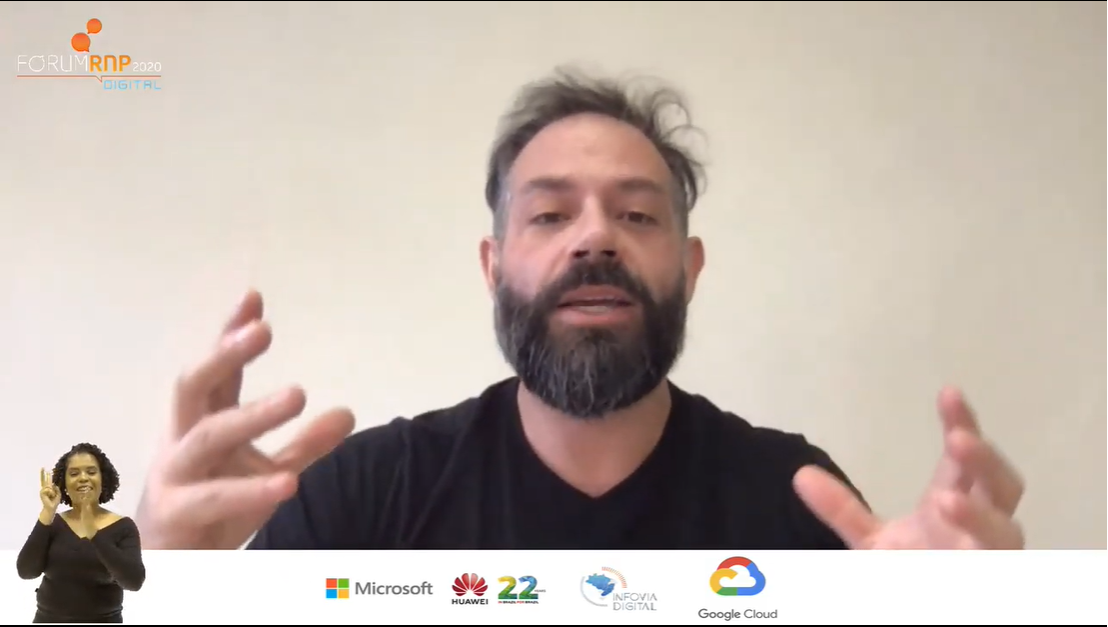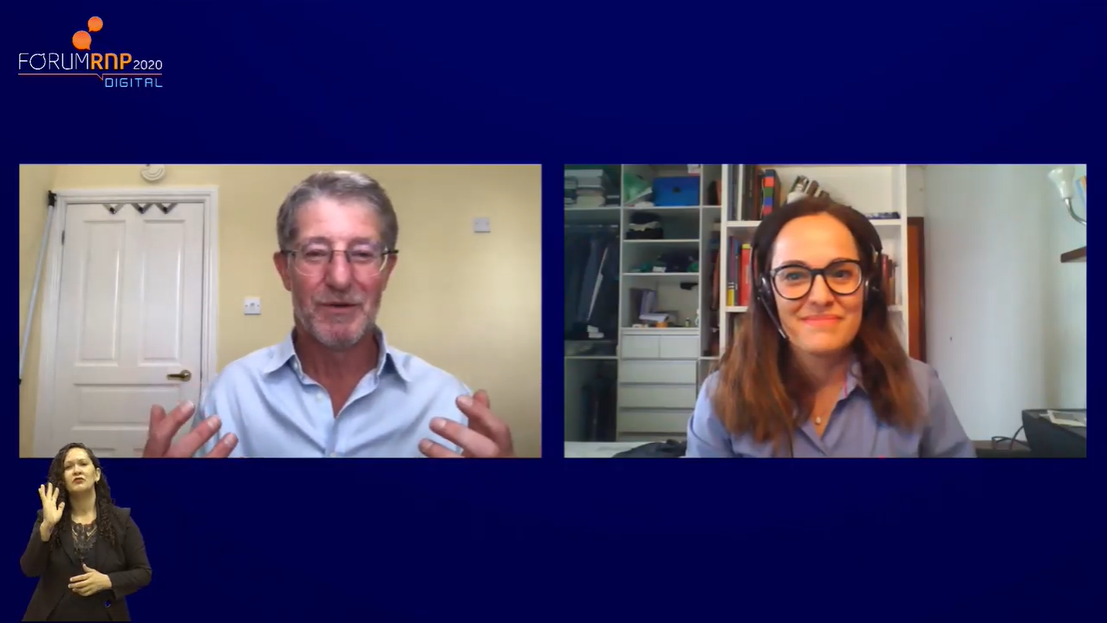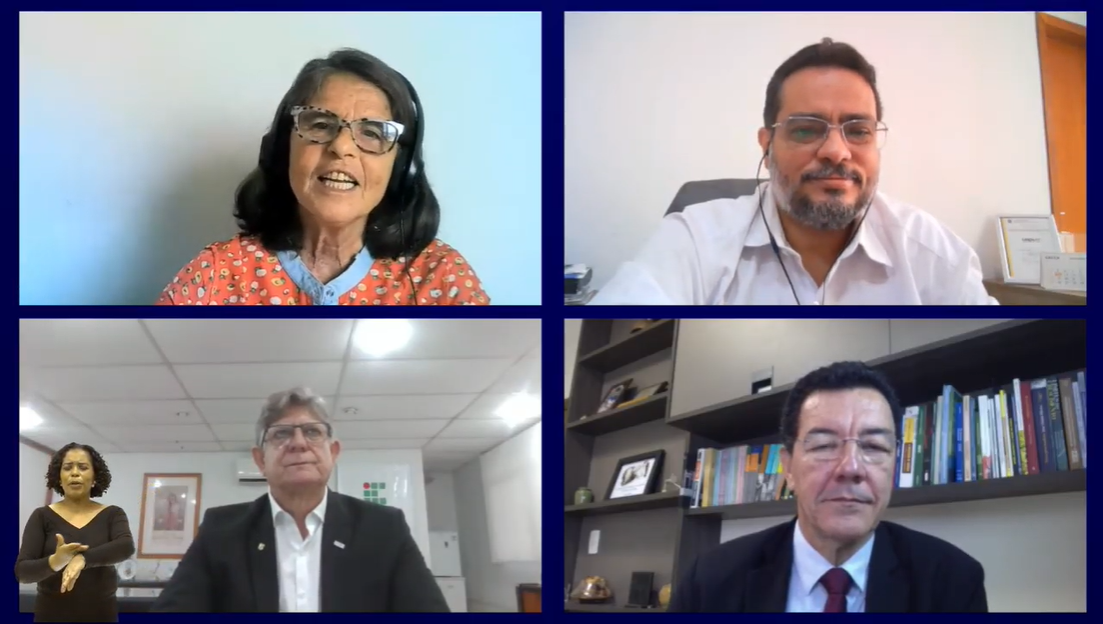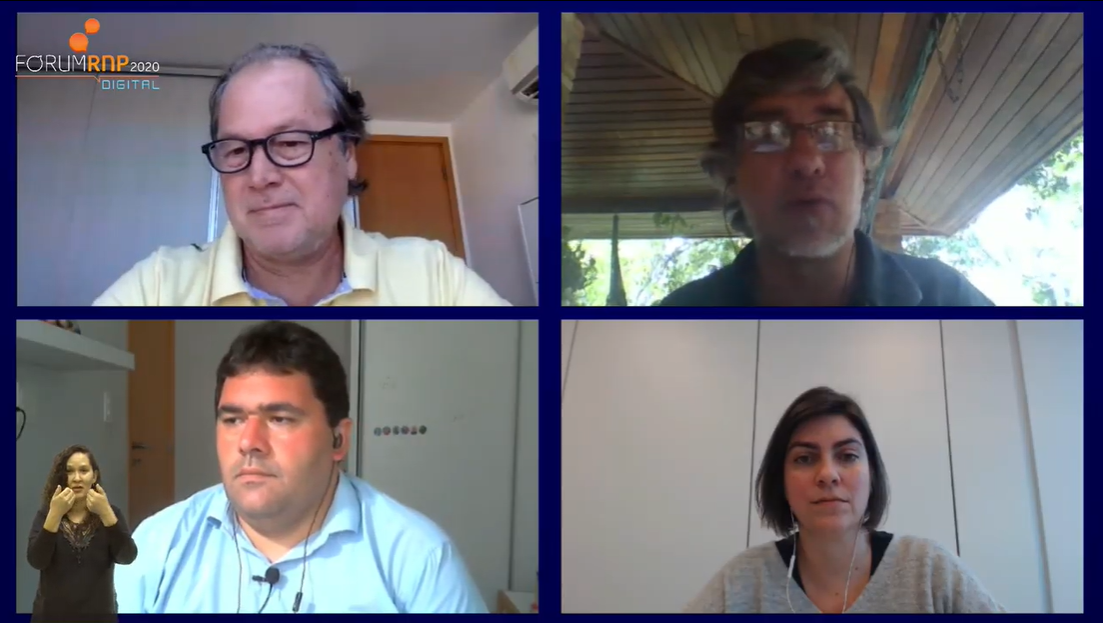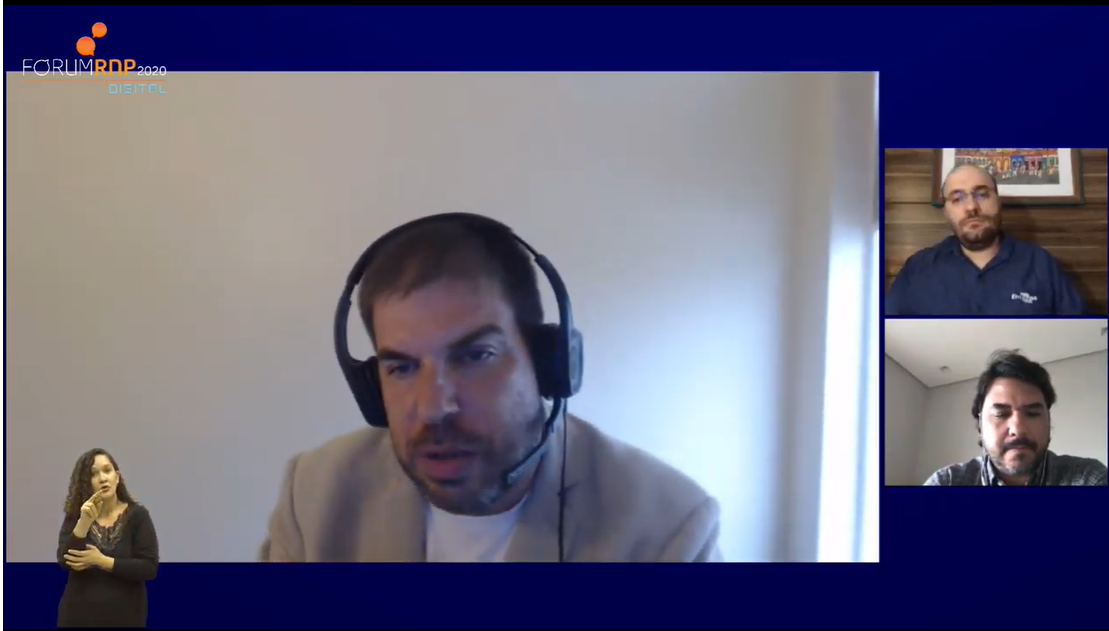Digital Innovation, JISC, Health and Government are highlights on the first day of #FórumRNP2020
The first day of #FórumRNP2020, which, due to the pandemic is held 100% digitally between October 19 and 21, brought many subjects related to the main topic of the 9th edition of the event: “Meeting with the Future”. The general director RNP Nelson Simões opened the virtual meeting and highlighted the fundamental role of collaboration as conducting wire of the future.
"We don´t know what future will be, therefore, this is the topic of the Forum this year. We believe that future will be here on these event days. We hope you leave the even building the future for all of us in research and education", the director affirmed.
Read a summary of what happened on the first day of the event:
Jacson Fressato: What motivates you to innovate?
The maxim that innovation is a condition to survive is quite different from the way the activist hacker and system architect Jacson Fressato sees innovation. For him, it is a creative, not productive factor. “You cannot put innovation in a production line. If the corporation and the people don´t have innovative spirit, no one will implant. There is no innovation spreader!”, he defends. The keynote inspired those who attended the panel “What motivates you to innovate?” because, in his case, the need to innovate came from a painful situation.
In 2010, Laura, Jacson´s first daughter was born prematurely and fought for her life in ICU. On the 18th day, the girl died due to sepsis. “After I buried Laura, I went home to search about sepsis and why this happened to my daughter. I ended up finding out that there are no guilty, but there are many victims. I got motivated to do something”. And he did: he created the first cognitive risk-management robot in the world, that could not be called otherwise, but Laura. Nowadays, the technology has already helped saving about 24 thousand lives!
Paul Feldman: “What we are doing now will change the way students learn in the next years”
The executive chief of the academic network of the United Kingdom (JISC) Paul Feldman opened the 9th edition of the RNP Forum, this year 100% online and free of charge. With the topic “The United Kingdom vision of the future of higher education accelerated by Covid-19", Feldman shared his vision about the changes in the way of learning in the next years.
Feldman presented JISC, an organization that offers technological solutions and connects different institutions in a secure and high-capacity environment. As an example of these solutions, he mentioned a virtual library that gathers two thirds of the British universities and a solution that helps students to find their first jobs, through business intelligence.
“We see a change in the way the students will learn in the next years”, Feldman affirmed. The speaker mentioned virtual reality as a key-technology to transform learning as interactive experience and highlighted Artificial Intelligence as well. “With Artificial Intelligence, each student will be able to have an individualized learning experience”, he complemented.
According to him, the technology changed the nature of careers and now, it is necessary to teach the new skills people must have, the so-called soft skills. “The next generation´s experience will be so different than ours that we will have to re-design the way we teach. Otherwise, it will not be sustainable in the next decades”, the speaker warns.
Lessons learnt in 2020 in higher education
Already traditional in all editions of the RNP Forum, the round table with deans of national universities, moderated by the RNP Relationship manager Beatriz Zoss approached the challenges, the lessons and the opportunities 2020 together with the pandemic of the new coronavirus brought to the higher and technical education institutions.
“The biggest experience the pandemic brought was the unpredictability and the need to make decisions all the time before an absolutely unpredictable situation. Without any doubt, it brought to us, managers, the need to review concepts, update the information and be forced to change the course according to what the virus imposed and still imposes to us", the president of Andifes and dean of UFG Edward Madureira Brasil highlighted. The president of Conif and dean of Ifes, Jadir José Pela, and the president of Abruem and dean of Unemat Rodrigo Bruno Zanin also participated in the debate.
Prospection of Digital Health after Covid
Extremely important topic in 2020, there was a panel on Digital Health, where the work developed by the RNP Digital Health Technical Committee (CT-Digital Health) was reported. The presentation was moderated by the Health Relationship specialist from RNP/RUTE Paulo Lopes and the guests told the roles played by the respective teams they were part of.
Luciana Portilho, coordinator of the TIC Saúde research in Cetic.br/NIC.br, approached the actions of Team 1, who dealt with the gap regarding the professional qualification for the Digital Health area: only 20% of the establishments have professionals qualified in the health area working in IT departments. The professor from the Informatics Department of the UFPB Informatics Center Guido Lemos represented Team 2, who dealt with the prospection of components for the RNP cyberinfrastructure necessary to promote education and research in Digital Health. Fernando José Ribeiro Sales, member of the Brazilian Society of Biomedical Engineering and deputy professor at UFPE, presented the importance of the creation of a Digital Health knowledge body, focus of Team 3, and insisted on highlighting: “Digital is not a substitute for the existent health systems. It is complementary".
Digital Government Department: “The principle of digital transformation is cultural change”
The deputy secretary of the Digital Government Ciro Avelino from the Ministry of Economy was one of the special guests of the RNP Forum 2020 and approached the strategies of the Federal Government to keep up with this new paradigm we are living in an unreversible way. “For us, Digital Government is the concept of a government, which is a service provider for a digital society”, Avelino said. “Our strategy is to deliver a simple government focused on the citizen, on delivery of value”.
According to the secretary, 61% out of the 3,911 public services already use digital platforms. From January 2019 until October this year, more than one thousand services were digitalized, only during the pandemic, 350 services were digitally transformed. An example is digital Employment Booklet service, which the citizens can access through application today, saving R$ 31 million for the public treasury per year.
The secretary highlighted the importance of transparency, less bureaucracy and focus on people. “The principle of digital transformation is cultural change. How do we do that? By focusing on people. The technology does not change the world, it helps people, and they change the world”, Avelino completed.
Learn more about the Digital Government strategies
Strategic vision of the research and innovation in digital agriculture
Technology and agriculture must walk closer. The result? More efficiency and savings. This was one of the lessons learnt by those who watched the panel with professionals from Embrapa. For the future, agriculture must be more multifunctional, integrated and complex, with quick response. “If until the XX century agriculture was a food provider, now, it must meet other demands, such as nutrition and health. ‘Bio’ is the key word! The idea is to increase productivity to decrease the pressure on the native ecosystems”, the researcher from Embrapa Geraldo Martha explained. The context is also fundamental and therefore, issues, such as climate changes and biological safety, shall be taken into consideration. When we talk about sustainability, we must look at the multiplicity of the concept: economic, social and environmental.
The new horizon for digital certificates in Brazil
The new digital certification opportunities in Brazil were the subject of the closing panel of the Forum moderated by Anderson Costa, IT Governance general coordinator at the Digital Government Department of the Ministry of Economy. With Ruy Ramos, from the National Information Technology Institute (ITI), and the professor from UFSC Ricardo Felipe Custodio as guests. The panel approached the change brought by the MP 983, that makes use of digital certificates flexible in Brazil; what a Public Key infrastructure (ICP) is, and which exist in Brazil; including the of Public Keys Infrastructure for Education and Research (ICPEdu), offered by RNP.
Funny stories about the internet in Brazil
In the closure of the first day, RNP Forum 2020 promoted a moment for relaxation with well-humored stories from RNP´S trajectory and the arrival of the Internet in Brazil. Upon presentation by the master of ceremonies Bruno Mota, the executive directors of the organization Nelson Simões, José Luiz Ribeiro Filho, Eduardo Grizendi, and Iara Machado, in addition to the deputy director of Network and Operations Engineering Ari Frazão, and the “internet builders” Claudete Alves, and Teresa Moura, alternated telling funny stories and provoked smiles and funny comments from the participants.
- Haven’t subscribed to #FórumRNP2020 yet? Subscribe now here!
- To learn more about the event, follow RNP social media!
